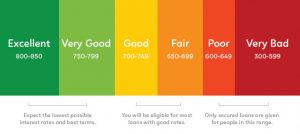If you’ve recently applied for a job, you’ll be familiar with the stacks of paper a new employer asks for. It’s not just a CV and a quick interview any more. Some of the checks, such as nationality verification, are legal requirements. Some jobs also require a criminal records check, or DBS. In other cases, it’s often down to the employer to decide which types of checks they want to do. Their decision will be based on the type of role and the nature of their business. Increasingly, employers are asking applicants for permission to run credit checks on them. Unlike a criminal check, this is about looking into your financial past. What are credit checks all about, and do you have to agree to have one?
Why do employers do credit checks?
 From an employer’s point of view, credit checks are all about minimising risk. Recruiting the wrong person can cost a company a lot of money. One scenario is that you recruit someone who just isn’t a good fit and you have to let them go in a few weeks and start the recruitment process from scratch. A far more costly scenario is hiring someone into a position of trust who then empties the company’s bank account and disappears. It’s not unheard of. So part of the standard pre-employment checks in many organisations is asking for your consent for a credit check. Don’t read anything into it if you’re asked to consent. It doesn’t mean that your employer is concerned about you, or thinks you might have a dodgy past. It’s all about protecting their business, its bank account and its reputation.
From an employer’s point of view, credit checks are all about minimising risk. Recruiting the wrong person can cost a company a lot of money. One scenario is that you recruit someone who just isn’t a good fit and you have to let them go in a few weeks and start the recruitment process from scratch. A far more costly scenario is hiring someone into a position of trust who then empties the company’s bank account and disappears. It’s not unheard of. So part of the standard pre-employment checks in many organisations is asking for your consent for a credit check. Don’t read anything into it if you’re asked to consent. It doesn’t mean that your employer is concerned about you, or thinks you might have a dodgy past. It’s all about protecting their business, its bank account and its reputation.
Do checks apply to all roles?
This type of financial history check is really only relevant to people working in a specific type of role. Firstly, it applies to people who are handling large sums of cash. Retail businesses may do checks on everyone, but more commonly they are reserved for people working in the cash office, or managers. People who have access to the full day’s takings, for example. Another group which might have a check are people working moving money digitally. They might be in a bank’s call centre or a bank branch, but could also be in an insurance company, accounting firm or similar. If your role doesn’t involve you handling money, having access to customer’s funds or raising invoices, it’s unlikely you will be asked to consent to a check.
What is on my credit file?
It’s important to remember that your employer doesn’t have access to some sort of special information which you can’t find out for yourself. All they can do is log onto one of the big credit reference sites such as Experian, Equifax or Clearscore and look at your file. So rather than worrying about what a check will flag up, look for yourself. Credit scores are usually expressed as a number between 0 and 999. This isn’t a pass or fail scenario. In general terms, the higher the number, the better “risk” you are.
Employers aren’t really interested about whether you have a loan for your car and how much your mortgage is. They are more interested in finding out whether you are in financial difficulty. The hard facts are that someone who is in serious financial difficulty and allowing debts to go in paid could be tempted into fraud. So if you are constantly missing payments on credit cards and are in serious default on your electricity bill, you might struggle to pass a credit check.
How do I improve my performance in credit checks?
You have lots of control over your credit score. The first thing the reference agency does is checks the electoral register. If you’re not on it, your score plummets. So register to vote at your home address. Secondly, check your file to make sure there is nothing on there which doesn’t belong to you. Identity fraud can mean that some people can have debt incurred against their name which has nothing to do with them. Then start tackling your debts; making regular payments is better than getting into default. Finally, deal with any unpaid CCJs which are still sitting on your file from many years ago.